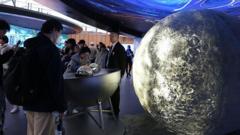In a significant move towards scientific collaboration, China has allowed researchers from the United States and five other nations to study lunar rocks retrieved from the Moon, despite the backdrop of fraught trade relations between the two superpowers.
China Expands Moon Exploration Diplomacy, Sharing Samples with U.S.

China Expands Moon Exploration Diplomacy, Sharing Samples with U.S.
China has opened its lunar sample collection to scientists from six countries, including the U.S., amidst ongoing trade tensions.
China’s National Space Administration (CNSA) announced on Thursday that institutions funded by NASA will have the opportunity to examine materials collected during the Chang'e-5 mission in 2020. CNSA chief Shan Zhongde referred to these moon samples as "a shared treasure for all humanity". While U.S. lawmakers impose restrictions on NASA's collaboration with China, experts argue that this scientific cooperation largely transcends political agendas.
Under a 2011 law, NASA is prohibited from working with China or any associated entities unless expressly authorized by Congress. Nevertheless, former Space Policy Institute director John Logsdon clarified that lunar sample examination holds no military importance, representing instead a global trend of science-based collaboration.
The ongoing trade war between the U.S. and China includes severe tariffs, with the U.S. imposing tariffs as high as 245% on Chinese goods and China retaliating with 125% tariffs on U.S. imports. Despite this tension, there have been indications from U.S. leadership regarding potential de-escalation, though China robustly contests claims of negotiations.
In 2023, the CNSA called for applications for research into the Chang'e-5 samples, which are particularly intriguing due to their geological age, being approximately a billion years younger than Apollo mission samples, suggesting more recent volcanic activity on the Moon.
Last year, U.S. and Chinese space officials attempted to negotiate a sample exchange, but an agreement did not materialize. The institutions authorized to study the samples include Brown University and Stony Brook University, alongside research teams from France, Germany, Japan, Pakistan, and the UK. Shan expressed that the CNSA is committed to fostering international collaborations in space, aligned with its Belt and Road Initiative, stating, "I believe China's circle of friends in space will continue to grow."
Under a 2011 law, NASA is prohibited from working with China or any associated entities unless expressly authorized by Congress. Nevertheless, former Space Policy Institute director John Logsdon clarified that lunar sample examination holds no military importance, representing instead a global trend of science-based collaboration.
The ongoing trade war between the U.S. and China includes severe tariffs, with the U.S. imposing tariffs as high as 245% on Chinese goods and China retaliating with 125% tariffs on U.S. imports. Despite this tension, there have been indications from U.S. leadership regarding potential de-escalation, though China robustly contests claims of negotiations.
In 2023, the CNSA called for applications for research into the Chang'e-5 samples, which are particularly intriguing due to their geological age, being approximately a billion years younger than Apollo mission samples, suggesting more recent volcanic activity on the Moon.
Last year, U.S. and Chinese space officials attempted to negotiate a sample exchange, but an agreement did not materialize. The institutions authorized to study the samples include Brown University and Stony Brook University, alongside research teams from France, Germany, Japan, Pakistan, and the UK. Shan expressed that the CNSA is committed to fostering international collaborations in space, aligned with its Belt and Road Initiative, stating, "I believe China's circle of friends in space will continue to grow."




















